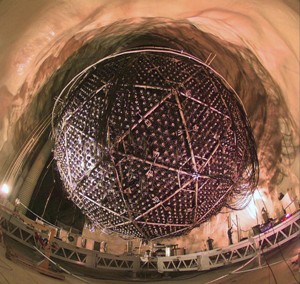Nov 25 2015
Doug Cowen, professor of physics and of astronomy and astrophysics at Penn State, and Gordana Tešić, a postdoctoral researcher in Cowen's group, are members of a team of scientists that has been recognized with the 2016 Breakthrough Prize in Fundamental Physics. The award, which recognizes major insights into the deepest questions of the universe, includes a $3 million prize. This year's prize will be split among five separate teams that are being recognized “for the fundamental discovery of neutrino oscillations, revealing a new frontier beyond, and possibly far beyond, the standard model of particle physics," according to the award citation.
 Fish-eye photo of the SNO Detector. Image: SNO
Fish-eye photo of the SNO Detector. Image: SNO
"Neutrinos are fiendishly difficult to detect, but they make up three of the 12 known fundamental particles of matter," said Cowen. "In some sense they are the smallest known particle. Most solar neutrinos slip through the entire Earth, evading contact with even a single atom. A few do interact, and by being patient and making very sensitive detectors we can detect the rare ones that bang into something even as the rest of them pass through without a trace."
Cowen and Tešić were members of the Sudbury Neutrino Observatory team that resolved a 25-year-old problem by discovering that neutrinos produced in the fusion reactions in the core of the Sun were changing into another type of neutrino as they streamed out of the Sun through space and were detected on Earth. Previous measurements of solar neutrinos could tell scientists only that they were seeing fewer neutrinos than predicted but were not sensitive enough to reveal why.
"Traditionally, awards like these are given to one or at most a few individuals, but these experiments, and others like them, rely on the creative contributions of often hundreds of scientists," said Cowen. "This award explicitly recognizes this new paradigm for making important scientific advances."
The other international experimental collaborations studying neutrino oscillations that shared in the prize include: the Super-Kamiokande Neutrino Detector, the Kamioka Liquid Scintillator Antineutrino Detector (KamLAND), the T2K and K2K collaborations, and the Daya Bay Reactor Neutrino Experiment. Each of the five large-scale scientific collaborations made their own distinct and fundamental contribution to understanding the properties of neutrinos.
The Breakthrough Prizes were founded by Sergey Brin and Anne Wojcicki, Jack Ma and Cathy Zhang, Yuri and Julia Milner, and Mark Zuckerberg and Priscilla Chan. The prizes aim to celebrate scientists and to generate excitement about the pursuit of science as a career. Breakthrough Prizes are funded by a grant from Sergey Brin and Anne Wojcicki's foundation, The Brin Wojcicki Foundation; a grant from Mark Zuckerberg’s fund at the Silicon Valley Community Foundation; a grant from the Jack Ma Foundation; and a grant from the Milner Foundation. Prize winners are chosen by a selection committee comprised of prior recipients of the prize.